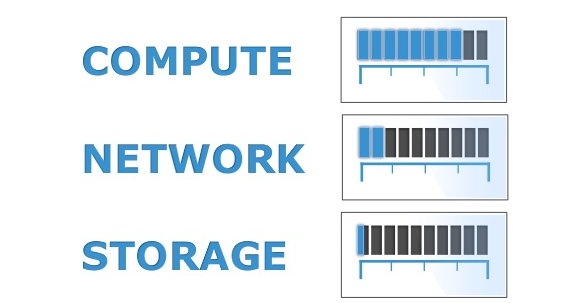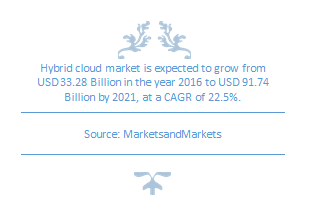Every organization structures a strategy with an obvious objective in mind – to drive profit-margins by making proficient use of technologies that they have invested in. Spotting a faster pace of innovation in the cloud technology, many leading companies are now planning a move to grow their revenues, make smarter decisions, help their end-users’ achieve goals, and build a line of products or services that prudently satiate requisite demands at far greater speed and lower cost than ever before.
At the outset, applications delivered as a service include – databases, custom programming tools, data, and middleware. As applications, cloud infrastructure services are following the same footprints that include servers, storage, and networking. The Infrastructure as a Service model of cloud allows clients to leverage a smorgasbord of benefits including economies of scale and enhanced productivity. However, the present business economics isn’t flexible enough to power up the demands of all organizations planning to invest in the cloud.
Business Concerns
One-size doesn’t fit all. There is a host of applications that are not written as per the cloud ecosystem and will not be able to cater to the regulatory and performance demands. This thought scares many businesses considering cloud hosting services.
Another cadre of companies is in a dilemma to understand how to foster their existing IT infrastructure and applications while embracing the cloud technology.
A Wake-up Call for Cloud Service Providers
Clients considering cloud Service Providers technology to leverage the scalability of built-in cloud applications may also need to customize IT deployment services for their mission-critical workloads (that continue to operate in corporate data center facilities), hassle-free configuration and network connectivity across different environments to manage their operations. It is important that cloud IaaS benefactors should design and balance their offerings in such a way that it backs heterogeneous needs of the clients across different domains, or be ready to face the chances of being left out.
Further, in this blog, you will read about the essential attributes that every chief technology officer should consider when making a choice:
Beyond Computing Resources…
The benefits of cloud are quite pertinent, such as usage-based consumption model, elasticity, on-demand resource provisioning, and premium bandwidth connectivity. However, cloud Infrastructure as a Service is not only limited to computing resources. It is important that a cloud service provider’s facility should be underpinned with a trail of custom-tools and services, including databases, and identity and management services, so that businesses can quickly transform and grow through such offerings. Another compelling benefit of offering such services allows businesses to cut back costs and intricacies associated with the procurement and management of operational resources required to run business workloads.
More to add, businesses that do not want to encounter certain complications of a multi-tenant environment (processor, RAM, and network resources are shared on a host server) wherein performance issues can arise if two VMs on the same host node encounter peak traffic demands at the same time. In this scenario, such companies should team up with a cloud IaaS provider that offers dedicated servers coupled with all cloud Service Providers benefits on a pay-per-use cloud consumption model.
A Hybrid Approach
Businesses are increasingly showing confidence in hybrid cloud model to maintain core workloads in on premise data center facilities owing to a host of reasons, including the sensitivity of data and rest on the public cloud to leverage better elasticity and boost collaboration. To meet this demand, providers should opt for multilevel approach and have high-end hardware, software, and networking platform to manage workload requirement of businesses. Besides, businesses should look for IaaS vendor who can proficiently replicate their application ecosystem and virtualized workloads within the public cloud hosting ecosystem. This, in turn, will provide businesses an access to the hybrid platform, allowing them to cater to multiple objectives.
There is no denying the fact that public cloud computing allows businesses to gain agility and capitalize on new market opportunities. Still, many forward-looking leaders are reluctant to move their complete IT ecosystem to the cloud. They look forward to a hybrid model that can help them leverage cloud benefits, however in a hybrid model, allowing them to manage workloads both on cloud Service Providers and on-premises. The service provider should offer a portfolio of cloud-enabled services to businesses, so that they can run and manage their applications the way they wish to.
The best cloud Service Providers infrastructure service providers should embrace the hybrid cloud ecosystem to meet the heterogeneous IT scenarios in a performance-driven environment.






 Live Chat
Live Chat


